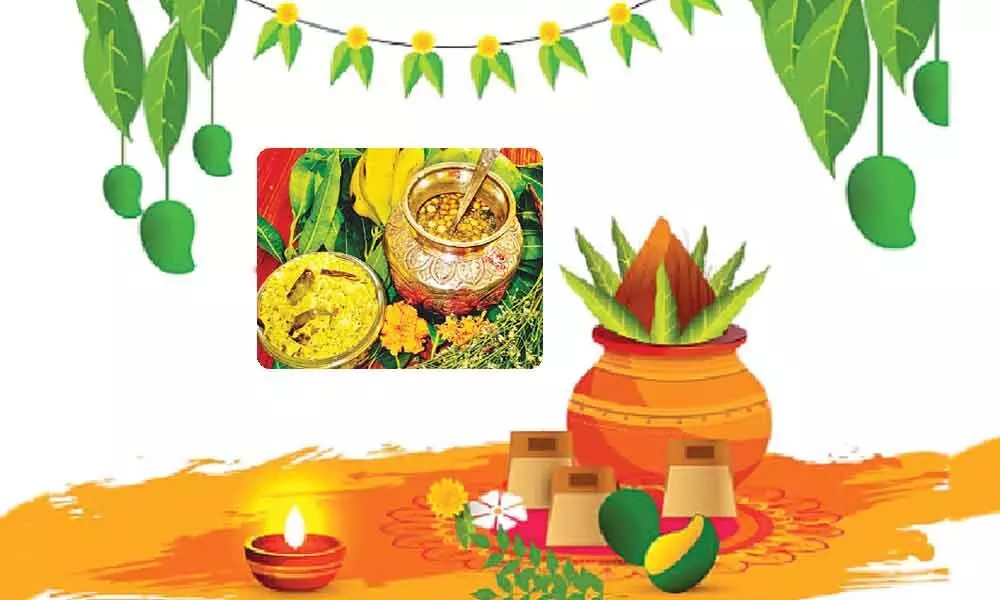Ugadi: The festival of hope

Ugadi is time to celebrate nature and nurture positive thoughts and actions that will pave the way for change that will bring a tomorrow better than today
The time of the year when new leaves make their appearance, boughs are filled with flowers, the skies are blue, the sun is bright and the song of the cuckoo heralds the advent of a new day.
Yes, spring is the season of freshness, new beginnings and glad tidings as nature gets into celebratory mode blossom by blossom. If poetry, verse and song flow naturally during this time, put it down to the magic of spring known as Chaitra or Vasantha in India.
This is when many parts of the country celebrate "Ugadi" the New Year with renewed optimism and hope, as the promise of a better tomorrow appeals to all sections of people including the rulers and the ruled.
Chaitra Shukla Padyami that ushers in Ugadi with the first rays of the sun is when Brahma as Creator ( Parajapati} shaped this world according to the "Narada Purana" and in celebrating this day annually we pay obeisance to all of creation, especially the calculation of time and the emanation of poetry.
The Mathsyapurana states that this was the day when Vishnu in the form of a fish (mathsyavatara) retrieved the Vedas and handed them over to Brahma. This festival then is mentioned in three Puranas, the Narada Purana, Brahma Purana and the Mathsya Purana.
"Yuga" means two, and the division of time into two halves, day and night supposedly began from this day. "Uga" is a term that traces the movement of a star and "Ugadi' ( Ugasya Adi Ugadi) is when the division and tracking of time emerged along with the whole of creation.
"Kavi sammelanam" (gathering of poets) and "Panchanga Sravanam" (reading the almanac) are rituals typical to this festival which comes with a different name each year.
The lunar calendar that we follow has 60 year cycle with a name attributed to each year and names are repeated after the completion of each cycle.
The Ugadi Pacchadi that is consumed in the morning with its six flavours (shadruchulu) encompasses the main emotions that go with human life and comes with the message that life is but an amalgamation of all (bitter, sweet, tangy, hot, sour, salty) and therefore wholesome.
The neem tree which flowers during this season and the mango tree which bears the first fruit at this time hold special significance for Ugadi which lays emphasis on purity of body and mind reinforced by the rituals.
The Panchangam or the five parts of the almanac are said to be born out of the five heads of Brahma and the creator is remembered on this day although there is no ritual worship to this deity.
Monsoons, crop yield, prosperity, peace, health, natural phenomenon and all aspects of life predicted at "panchanga shravanam" which began in temples and spread to different political parties along with official programmes by state governments is interesting since it has been taking a political turn.
Such predictions are intended to please the sponsor or person under whose supervision the programme is held much to the amusement of listeners. This is an engaging and much awaited ritual and people don't really care whether the predictions come true or not.
"phala shruti' (the result of listening) of the almanac according to Vedic scholars is victory over enemies, destruction of bad dreams (dusswapna) and benefit (punya ) equivalent to bathing in the Ganges, the holiest of holy rivers.
This year's Ugadi named "Sarvari" (night) being celebrated in the shadow of the mysterious Corona Virus that has created havoc around the world will be specially watched for health predictions as many lives are being lost the world over.
Although large gatherings are prohibited and most states are in a lockdown television viewers will certainly not miss their quota of predictions or poetry that eulogizes the festival.
Lovers of literature have a huge body of poetry written by eminent poets from the past and budding poets whose beautiful words capture the beauty of the festival brimming with optimism.
The year "Sarvari" also brings to mind the novel titled "Sarvari nundi Sarvari daaka" (from Sarvari to Sarvari) a chronicle of lives and times in a span of 60 years by literary doyen and Jnanpith awardee, the late Kavisamrat Viswanatha Satyanarayana.
Written in 1961, the novel begins in 1900 in the year "Sarvari" and traces the culture, tradition, economy, history, social practices and all aspects of life in a hamlet in the Telugu region.
Most importantly it tracked the change in human thought and outlook in a span of 60 years where the author explains the greatness of Indian culture and civilisation unhampered by the several threats to its existence and distinct identity.
Ugadi then is time to celebrate nature and nurture positive thoughts and actions that will pave the way for change that will bring a tomorrow better than today.










